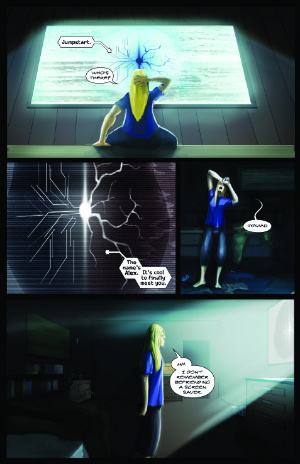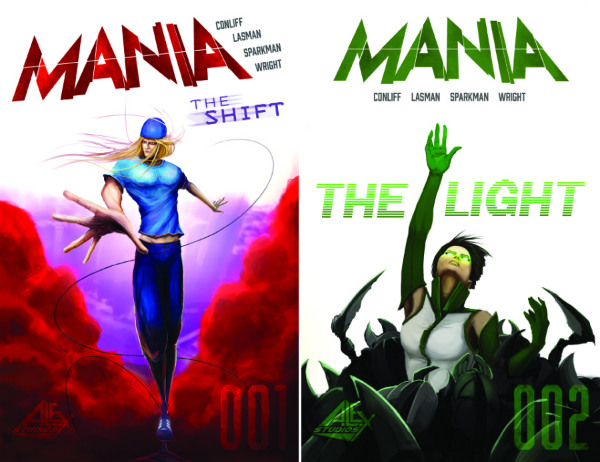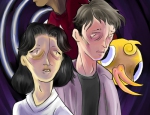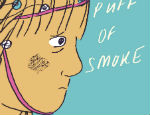The premise of Mania, the series of comics put out by A.L.Ex Studios and soon to number three issues, had promise. Nothing new in the dystopian metropolis, the super-powered renegades, the ethically dodgy technological corporations of course, but the idea of linking super-powers to mental health issues is the potentially interesting focus of the promotional material and what tempted me to read the currently available first two issues. Sadly, so far at least, these issues have not been addressed.
The blurb and accompanying material lay out the design studio’s intentions in world-building a city where citizens are brain-chipped and harmless, until psychological trauma (itself a problematic oversimplification of the origins of mental illness) triggers a transformation into “Supermanics”. But aside from the use of the name “Supermanics”, the characters and narrative do not address any of these fundamental ideas. Those non-supermanic characters we see aren’t shown as affected at all by the chips in their brain, and react to the instantaneous introduction of massive destructive supervilliany in underdeveloped predictable ways. Conversely the supposedly mentally ill heroes and villains on show don’t display any characteristics outside of the usual superhero melodramatic banter.
 Individually, the characters are not badly written, the story is cohesive and aside from a few jarring missteps of timing (the short distance a getaway car has travelled in the panel following an extended vroooooooom for example, which makes it look as if it stalled after going a few feet) the art is consistent and clear, if not particularly skillful. I particularly liked the image of a brain half-riddled with geometric circuitry lines and half with organic lightning tendrils which is used to represent the communications from a mysterious cyberhacker who in these issues is making themselves know to various supermanics. But on the whole the storytelling is not living up to its own ambitions.
Individually, the characters are not badly written, the story is cohesive and aside from a few jarring missteps of timing (the short distance a getaway car has travelled in the panel following an extended vroooooooom for example, which makes it look as if it stalled after going a few feet) the art is consistent and clear, if not particularly skillful. I particularly liked the image of a brain half-riddled with geometric circuitry lines and half with organic lightning tendrils which is used to represent the communications from a mysterious cyberhacker who in these issues is making themselves know to various supermanics. But on the whole the storytelling is not living up to its own ambitions.
To have an abnormal element to characters within a narrative you need to establish a norm. And to have a sinister omnipresent technocorporation you need to show them as omnipresent. My advice to the creators would be to do some hefty world-building and story-filling in in the next few issues and retroactively re-order the narrative in the TPB. I know that skilful creators in comics, film and prose are able to build tension and intrigue without revealing their cards too soon. But, with something this high concept, expecting your audience to wait until issue #3 or beyond to put the basic pieces together is not good practice. It may well be that when the planned six issues are put together there is a meaningful connection made with the actual experiences of people with mental health issues, rather than just a bog standard sci-fi romp, but so far this has not been evidenced.
Leon Conliff (W), Jeremy Lasman (Director), Teddy Wright IV (A), James Sparkman (L) • A.L.Ex Studios
Available to buy from the online store here.
















[…] Book Review: Mania – Nominally a Comic Book Exploration of the Negative Stigma of Mental Illness from A.L.Ex St… via @BrokenFrontier […]